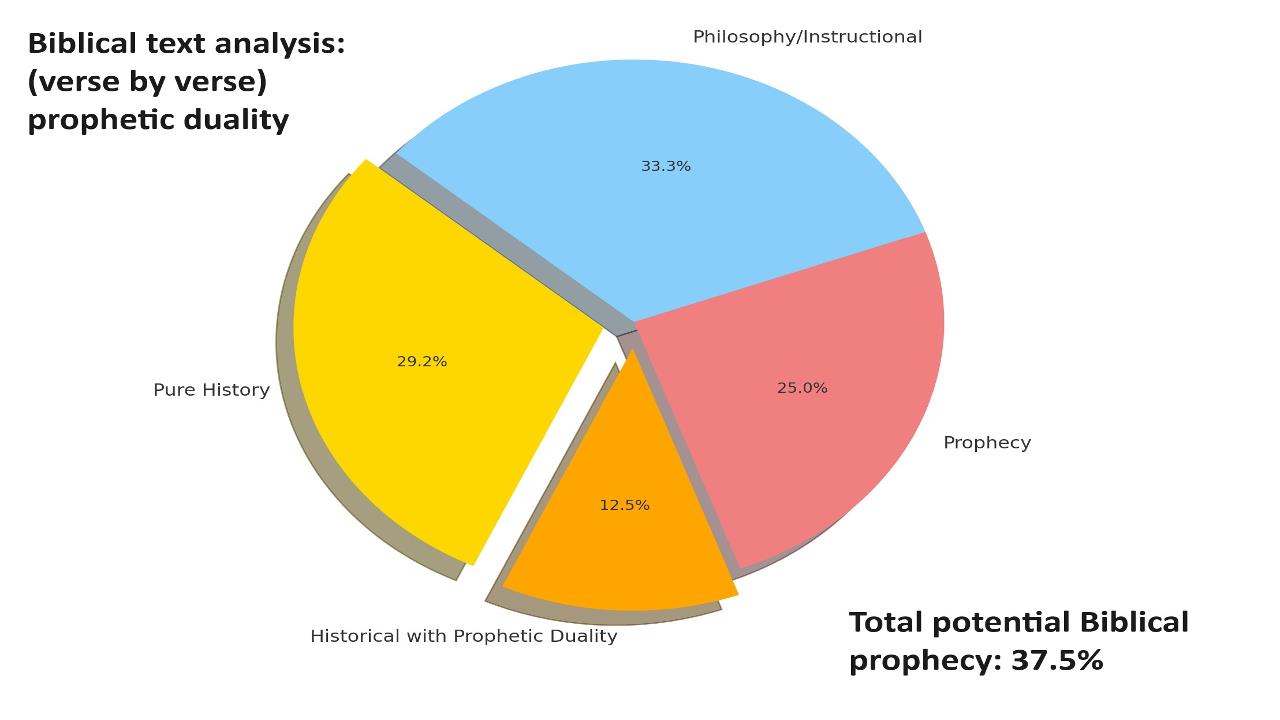Video:
Take our online poll:
AI Analysis:
Analyzing Biblical Text (Chapter by Chapter)
Creating a pie chart that categorizes the text of the Bible into history, prophecy, and philosophy/instructional based on volume is a challenging task. Here's a step-by-step outline of how we can approach this, followed by the creation of the pie chart:
Define Categories:
History: Narrative books that describe events and genealogies.
Prophecy: Books or sections where prophets deliver messages from God, often about future events or divine judgment.
Philosophy/Instructional: Books that contain laws, teachings, wisdom literature, and epistles that provide moral, ethical, and religious guidance.
Categorize Books of the Bible:
History: Genesis, Exodus, Leviticus, Numbers, Deuteronomy, Joshua, Judges, Ruth, 1 Samuel, 2 Samuel, 1 Kings, 2 Kings, 1 Chronicles, 2 Chronicles, Ezra, Nehemiah, Esther, Matthew, Mark, Luke, John, Acts. Prophecy: Isaiah, Jeremiah, Lamentations, Ezekiel, Daniel, Hosea, Joel, Amos, Obadiah, Jonah, Micah, Nahum, Habakkuk, Zephaniah, Haggai, Zechariah, Malachi, Revelation.
Philosophy/Instructional: Job, Psalms, Proverbs, Ecclesiastes, Song of Solomon, Romans, 1 Corinthians, 2 Corinthians, Galatians, Ephesians, Philippians, Colossians, 1 Thessalonians, 2 Thessalonians, 1 Timothy, 2 Timothy, Titus, Philemon, Hebrews, James, 1 Peter, 2 Peter, 1 John, 2 John, 3 John, Jude.
Count the Number of Chapters in Each Category:
Use the total number of chapters in each book to estimate the volume of text. Calculate Percentages: Sum the number of chapters in each category and divide by the total number of chapters in the Bible.
Step-by-Step Calculation
History:
Genesis: 50, Exodus: 40, Leviticus: 27, Numbers: 36, Deuteronomy: 34, Joshua: 24, Judges: 21, Ruth: 4, 1 Samuel: 31, 2 Samuel: 24, 1 Kings: 22, 2 Kings: 25, 1 Chronicles: 29, 2 Chronicles: 36, Ezra: 10, Nehemiah: 13, Esther: 10, Matthew: 28, Mark: 16, Luke: 24, John: 21, Acts: 28 Total: 452 chapters
Prophecy:
Isaiah: 66, Jeremiah: 52, Lamentations: 5, Ezekiel: 48, Daniel: 12, Hosea: 14, Joel: 3, Amos: 9, Obadiah: 1, Jonah: 4, Micah: 7, Nahum: 3, Habakkuk: 3, Zephaniah: 3, Haggai: 2, Zechariah: 14, Malachi: 4, Revelation: 22 Total: 269 chapters
Philosophy/Instructional:
Job: 42, Psalms: 150, Proverbs: 31, Ecclesiastes: 12, Song of Solomon: 8, Romans: 16, 1 Corinthians: 16, 2 Corinthians: 13, Galatians: 6, Ephesians: 6, Philippians: 4, Colossians: 4, 1 Thessalonians: 5, 2 Thessalonians: 3, 1 Timothy: 6, 2 Timothy: 4, Titus: 3, Philemon: 1, Hebrews: 13, James: 5, 1 Peter: 5, 2 Peter: 3, 1 John: 5, 2 John: 1, 3 John: 1, Jude: 1
Total: 366 chapters Total chapters in the Bible: 1189
Analyzing Biblical Text (Verse by Verse)
Categorizing the Bible on a verse-by-verse basis is more granular and would give a more precise breakdown of the text into history, prophecy, and philosophy/instructional categories. Count the Number of Verses in Each Category:
History: 13,000 verses approximately (Genesis, Exodus, etc.) Prophecy: 7,800 verses approximately (Isaiah, Jeremiah, etc.) Philosophy/Instructional: 10,400 verses approximately (Job, Psalms, Proverbs, etc.)
Total verses in the Bible: 31,102
Analyzing Biblical Text (Verse by Verse: prophetical duality)
To create a pie chart that reflects the duality of history and prophecy in the Bible, we need to further divide the history category into:
Pure History: Verses that are purely historical without any prophetic duality. Historical with Prophetic Duality: Verses that are historical but also have prophetic significance.
We will estimate the proportions for these subdivisions based on an analysis of how many historical verses are often interpreted as having prophetic significance.
Estimation for Historical with Prophetic Duality:
Historical Verses (41.8% of total verses): Approximately 13,000 verses. Historical with Prophetic Duality: Let's estimate that about 30% of historical verses have prophetic duality.
This gives us:
Pure History: 70% of 13,000 = 9,100 verses Historical with Prophetic Duality: 30% of 13,000 = 3,900 verses
Chart:

References:


Comments